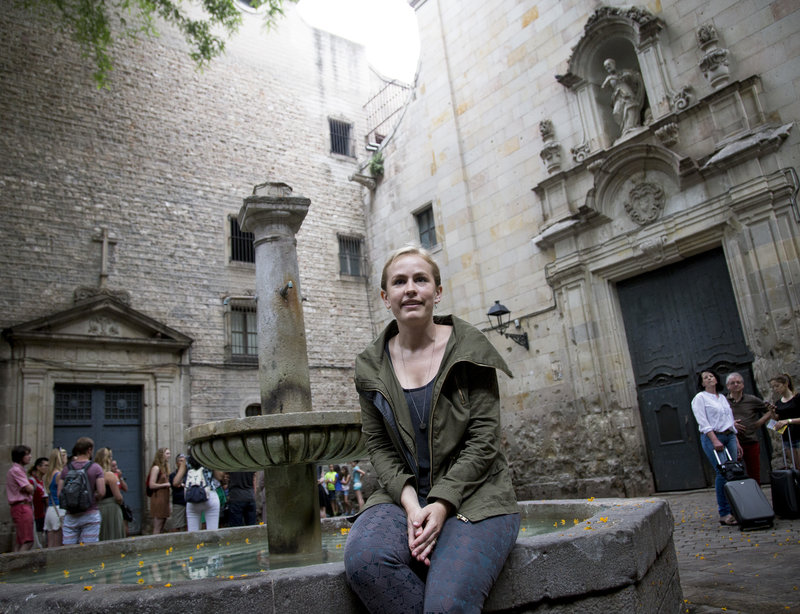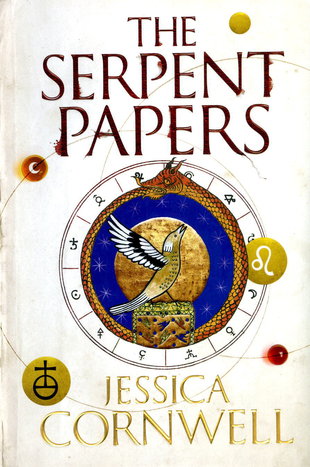Going to bed with the Devil
The next of our profiles on English-language novels set in Catalonia is Jessica's Cornwell first novel, and the first of a trilogy – the second part is due out in 2017 – which creates a world that is rooted in medieval alchemy, including coded documents and witch-hunts, and is interwoven with a series of murders committed in modern Barcelona
The Serpent Papers is not wholly successful. Three main points of criticism: it is disorganised, jumping about in place and in time between 1851, 2003 and 2014. There is nothing wrong with the author seeking such layers of complexity, but the leaps in time and place are often bewildering.
Second, the bizarre plot(s) do not demand attention or reach a convincing climax. The Serpent Papers is a thriller that does not thrill. It does chill at times, but that is with the easy, morally dubious trick of describing the mutilation of women. To justify yet another crime novel featuring a serial killer, Cornwell has said: “I wanted to show how this violence against us women has continued to occur throughout different periods of history.”* At best, this is naïve. To show this violence is to perpetuate vile images. To explain its roots would be something else, but this she does not attempt.
And third, the book is over-written. There are constant short, breathless, verbless sentences, which become tiresome: the writer is straining too much for effect. And her pacing is off. Everything's speedy; and if everything is so, the reader ends up turning the pages monotonously. The sensations of speeding up and slowing down are lost.
Traverser of the Void
It is, perhaps, too easy to find fault with a highly literate, young author who has poured her heart into a long, ambitious novel. Here the publisher, handling a book for which, reputedly, over 100,000 dollars for translation rights were paid at the Frankfurt Fair, is to blame. Failure to edit books is common, of course, but that makes it no less irresponsible. Why the hell does a reputable publisher like Quercus not pay someone 10,000 to supervise six months of editing and ordering of the material?
To really enjoy The Serpent Papers, you need to like historical novels with a lot of arcane mysticism. Here's a passage:
‘I call you Mystery!' she cried, pressing the relic box towards the heavens. ‘I call you Mendacious One of Red Erythre, Ida – born of wooded dells, mud-bound in stained Marpessus!… For I am the Liminal Nothingness! Traverser of the Void!'
With each name came a gust of wind, blowing the candles so that we were plunged into darkness. Convulsions racked her form, her colour changed and her hair rose – while a warmth like a hundred hands began pulling at my clothes and tugging at my hair. (p.307)
This gibberish is reminiscent of 19th-century Gothic novels or children's adventure stories of 100 years ago, like Rider Haggard's She. To be fair, the passage, from a letter written in Mallorca in 1851, is not fully representative of the novel. For much of the first half, the extraordinary events and murders could have a rational explanation. Towards the end, though, you need to suspend belief very high to follow the story's twists.
The plot involves Anna, a North-American academic with supernatural powers, hired by the Catalan police in 2014 to investigate a series of ritual murders in Barcelona that had occurred 11 years before. The suspects are members of a theatre troupe and the murderer is a Christian fundamentalist hunting down heretics and witches, a task passed down through generations of ‘enlightened' killers since the Middle Ages. Anna has her own agenda: she is hunting a lost alchemical palimpsest written in coded language (the ‘Serpent Papers' of the title), which, fortuitously, will provide the key to the murders.
Passionate about Catalan culture
Anna is not an easy person, neither for herself nor for those she meets. Cornwell skilfully sets the practical Inspector Fabregat against her hesitant, wounded personality. A different book is born with the Inspector and members of the theatre company. It drops back down-to-earth with snappy dialogue and several sharp scenes. For example, the Barcelona Corpus Christi procession is caught in four exciting pages (250-254):
Emily entered the delirium. Toddlers gaped in awe. Mothers wrangled their children into order. Confetti and streamers burst on the air! Laughter! Noise! Exuberance! Next came the Cavallets Cotoners – eight men and women in traditional costume: white tunic, scarlet velvet, knee-high boots. They danced in medieval hobby-horses. The parade joyous! Extravagant! Emily felt the thumping thud of feet, the clanging clatter of pans…
A mixed bag
Cornwell watches intensely and records well. She transmits her passion for Catalan culture. The Serpent Papers is one of the books in this series of articles that most evokes Catalan culture and language. She names Barcelona's streets with relish, describes houses and ceremonies lovingly and reveals ‘secrets' she believes most tourists don't find.
The Serpent Papers is a mixed bag. It's an intellectual mystery packed with murder and mystical belief, with flashes of brilliant writing and several vivid scenes. On the downside, the book is poorly organised and structured. It is a suitcase packed with too much obscure detail and too little tension. The author of the Serpent Papers has imagination and ability in plenty, but has not delivered the finished article.
She does, though, have a wonderfully arresting opening sentence: “It can happen suddenly that a young woman in the fullness of youth realizes she has gone to bed with the devil.”
*The two quotes are translated from the Spanish in an interview with Carles Geli, El País, 15/8/2015.
Haunting tongues
Jessica Cornwell was born in 1986 in Ojai, a small town in Southern California. She studied English Literature at Stanford. A postgraduate scholarship to research Lorca in Andalusia led on to an interest in Catalan theatre and a course at Barcelona's Autònoma University in 2009.
During this course she spent four months as a trainee with La Fura dels Baus. The theatre company was doing Shakespeare's nightmare play Titus Andronicus, with its chopped hands and excised tongues. They are images, Cornwell has said in interviews, that later haunted her. Cutting out the tongues of witches silenced women.
Another source for the novel was also erudite. She read Ramon Llull's Ars Magna. “It fascinated me how he told his truth on the basis of a system of symbols and letters.”*
The Serpent Papers (El llegat del serp in Catalan, from Edicions 62) seems a publisher's dream of a marketable product. It is a crime trilogy in fashionable settings (Barcelona, Mallorca); it has oracles and alchemy to take readers' minds off the real world's crises; an American narrator chaperones us into and through the story in a foreign land; foul murders stimulate horror at a safe distance; and its intellectual references flatter readers. But a novel is not a formula: little of this counts if the book doesn't work.
Since her year in Barcelona, Cornwell has lived between London and California.
Her web-site is www.jessicacornwell.com




